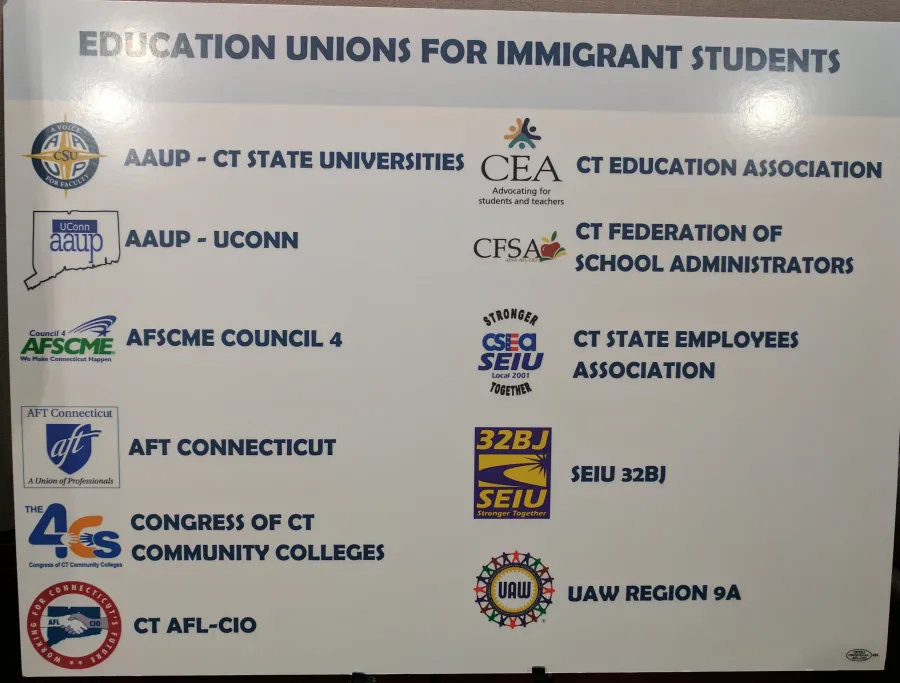Education Unions Unite to Ensure Fairness for Immigrant Students

HARTFORD – Today, the state’s education unions and the Connecticut AFL-CIO stood shoulder-to-shoulder with undocumented immigrant students to unite behind two bills – Senate Bill 17 and House Bill 7000. These bills will create a fair application process to allow all Connecticut in-state resident students who contribute to the Institutional Aid fund to have access regardless of their immigration status.
Institutional Aid is student-generated funds that colleges set aside from tuition revenue for use as need-based aid to support students with demonstrated financial need. Under current law, undocumented students are ineligible for financial aid despite paying into the fund with their tuition dollars.
“As a teacher, I know firsthand that all our communities benefit when we grow and expand – not restrict or limit – access to a quality education,” said AFT Connecticut President Jan Hochadel. “I am proud of our union members for advocating policies like equity in institutional aid at our public colleges and universities. It's consistent with our labor movement's shared values of fairness, respect and solidarity – values that we expect our lawmakers to uphold,” added Hochadel, who taught physics and science in the Connecticut Technical High School System.
The two bills have no fiscal note and would come at no cost to Connecticut’s taxpayers or universities.
UAW Region 9A Director Julie Kushner, who represents graduate Teaching Assistants and Research Assistants at the University of Connecticut, has worked extensively with Connecticut Students for a Dream, which is the lead advocate on this issue. “If our lawmakers do not pass this legislation, they are allowing the undocumented students to subsidize institutional financial aid for other students,” said Kushner. “It is grossly unfair and unjust, and our union will do everything it can to promote the passage of this legislation.”
The state’s universities – UConn, the CT State University system, and the Board of Regents – have already proclaimed their support for expanding aide to undocumented students. In addition to support from the administration, the professors at the universities are also supporting the increased access to financial aid.
“Research shows that when a community’s residents obtain higher education, those communities enjoy greater employment, higher incomes, lower crime rates, lower entitlement spending and lower disability rates,” said Elena Tapia, President of CSU-AAUP, which represents professors in the CT State University system. “Access to affordable and quality public higher education is a common good and a path to a more prosperous future not only for students but also for Connecticut.”
Professors at UConn feel the same way. Diana Rios, UConn-AAUP President and her members believe strongly that “it is in the best interest of our country and state to encourage access to education resources so that all segments of society may be lifted upwards.”
The bill even got the backing of the state’s largest labor organization. “It is extremely challenging, if not impossible, for undocumented students to afford college as options for financial aid are very limited,” said Lori J. Pelletier, President of the Connecticut AFL-CIO, which represents over 220,000 workers in the state. “All public universities in the state set a portion of tuition revenue aside to assist students with financial need. Nonetheless, because of current law, undocumented students have to contribute to this fund but are barred from accessing it. This is fundamentally unfair and needs to change this year.”
Juan Hernandez, District Leader of 32BJ SEIU represents thousands of immigrant members including some that work in the state’s colleges and universities. “Our members work hard to offer their children a brighter future, and are keenly aware of the importance of having access to financial aid to have a fighting chance in life,” said Hernandez. “Supporting access to student aid, no matter your immigration status, is not only the right thing to do, but it is the fiscally responsible solution. This legislation reinforces the spirit of inclusion and fairness that Connecticut residents have always supported.”
The state’s education unions vow to put their institutional support and strength behind this effort and hope to finally win passage of this legislation after a demanding three-year fight.
# # #
